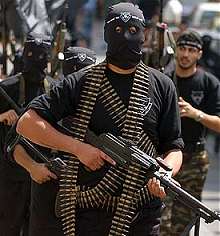I am speechless.
[IsraelTimes] An adviser to al-Qaeda’s likely current leader is calling for Hamas ..not a terrorist organization, even though it kidnaps people, holds hostages, and tries to negotiate by executing them,...
..not a terrorist organization, even though it kidnaps people, holds hostages, and tries to negotiate by executing them,...to release its Israeli hostages held in Gazoo
...Hellhole adjunct to Israel and Egypt's Sinai Peninsula, inhabited by Gazooks. The place was acquired in the wake of the 1967 War and then presented to Paleostinian control in 2006 by Ariel Sharon, who had entered his dotage. It is currently ruled with a rusty iron fist by Hamas with about the living conditions you'd expect. It periodically attacks the Hated Zionist Entity whenever Iran needs a ruckus created or the hard boyz get bored, getting thumped by the IDF in return. The ruling turbans then wave the bloody shirt and holler loudly about
oppressionand
disproportionate response...
, according to an American jihadist monitoring organization, SITE.
The online declaration was made yesterday by Mustafa Hamid, also known as Abu Walid al-Masri, who is the father-in-law of Saif al-Adel
...holed up in Iran from 2002 until 2010, when he made bail and moved back to the Pak-Afghan border...
, the man widely believed to now head al-Qaeda, according to SITE.
 In it, Hamid claims the attention given to recovering the Israeli hostages held by Hamas since October 7, 2023, both dead and alive, is overshadowing the fate of Paleostinian security prisoners being held by Israel.
In it, Hamid claims the attention given to recovering the Israeli hostages held by Hamas since October 7, 2023, both dead and alive, is overshadowing the fate of Paleostinian security prisoners being held by Israel.He also hails Hamas leader Yahya Sinwar, the criminal mastermind of the massacre that triggered the ongoing war in Gaza, who was killed by Israel this week.
Hamas must now "immediately" return the hostages and their bodies, and "this file must be closed and not opened again, as we know its consequences," according to the statement.
Indeed.
"No one cares about the Paleostinian prisoners, neither in the media, in negotiations, nor in demonstrations," it adds.Insightful. That’s probably how he got his daughter married off to that man.
Several experts consulted by AFP say Hamid is close to higher-ups in the core al-Qaeda organization.The group, which has spawned regional affiliates in Syria, Yemen
...an area of the Arabian Peninsula sometimes mistaken for a country. It is populated by more antagonistic tribes and factions than you can keep track of...
, Somalia and Mali, has little leverage over Hamas, which is backed by Iran.
| Meanwhile, back at the ranch… |
IDF dropping leaflets in Khan Yunis, Gaza:
— Vivid.🇮🇱 (@VividProwess) October 19, 2024
"Yahya Sinwar has ruined your lives. He hid in a dark tunnel and was eliminated when he attempted to flee in panic. Lay down your weapons, return the hostages, and live in peace.” pic.twitter.com/BPkYDfiXNK
Related:
Mustafa Hamid 01/24/2015 Two Journalists Among Seven Killed in Iraq Violence
Mustafa Hamid 11/06/2009 Australia must join Muslim Asia or perish - Taliban
Mustafa Hamid 12/11/2006 Rabiyah and daughter married terror twins
Mustafa Hamid 01/24/2015 Two Journalists Among Seven Killed in Iraq Violence
Mustafa Hamid 11/06/2009 Australia must join Muslim Asia or perish - Taliban
Mustafa Hamid 12/11/2006 Rabiyah and daughter married terror twins
Related:
Abu Walid al-Masri 07/31/2018 Syrian Army's Daraa adventures: Egyptian ISIS emir reaches neutrality, former rebels fight alongside, final ISIS stronghold taken
Abu Walid al-Masri 12/06/2009 Hotline to the jihad
Abu Walid al-Masri 07/31/2018 Syrian Army's Daraa adventures: Egyptian ISIS emir reaches neutrality, former rebels fight alongside, final ISIS stronghold taken
Abu Walid al-Masri 12/06/2009 Hotline to the jihad
Related:
Saif al-Adel 09/15/2024 RUMINT: Hamza, son of Osama bin Laden, alive and preparing attacks on the West
Saif al-Adel 03/11/2024 AQAP announces the death of its emir Khalid Batarfi
Saif al-Adel 02/15/2023 Iran-based trainer of 9/11 hijackers Sayf al-‘Adl believed to be new al-Qaeda chief
Saif al-Adel 09/15/2024 RUMINT: Hamza, son of Osama bin Laden, alive and preparing attacks on the West
Saif al-Adel 03/11/2024 AQAP announces the death of its emir Khalid Batarfi
Saif al-Adel 02/15/2023 Iran-based trainer of 9/11 hijackers Sayf al-‘Adl believed to be new al-Qaeda chief

